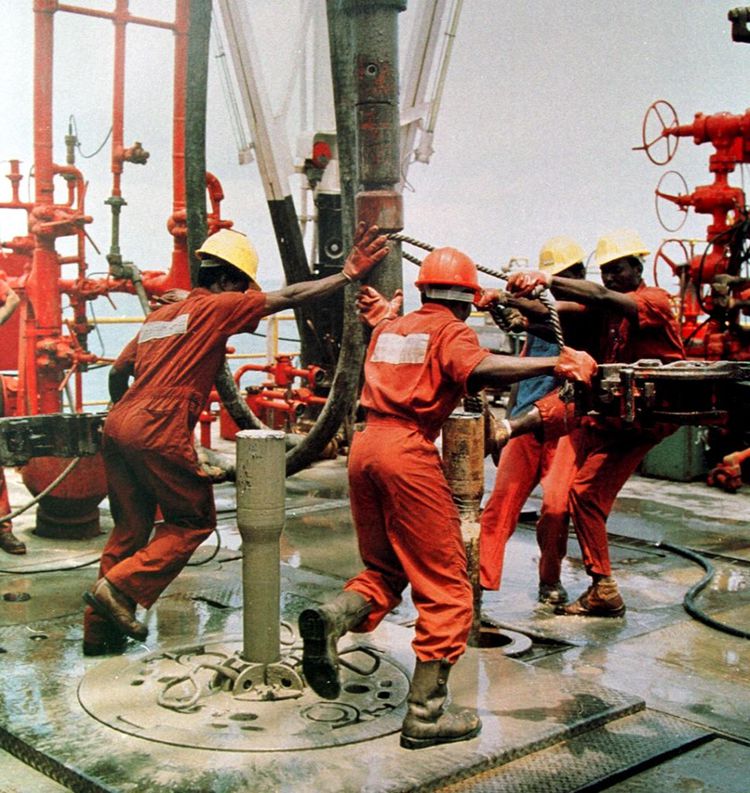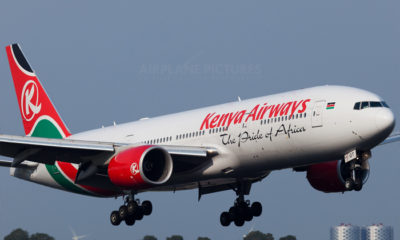Economy
NNPC Sustains Oil Search in Chad Basin
Published
8 years agoon

- NNPC Sustains Oil Search in Chad Basin
Nigeria’s pursuit of an enlarged crude oil reserve is being sustained by the Nigerian National Petroleum Corporation, which recently indicated that it would resume its oil search in the Chad Basin following signals by the military that it was now safe to get back to the venture, writes Chineme Okafor, who also examines the possible impact on the economy.
Past reports on Nigeria’s oil exploration in the frontier basins had indicated that between 1977 and 1996, the Nigerian National Petroleum Corporation (NNPC) commenced exploration activities in the Chad Basin during which 23 wells were drilled and only two wells – Wadi-1 and Kinasar-1, recorded non-commercial gas discoveries before exploration was suspended in the Chad Basin in 2000 for lack of commercial finds.
Similarly on the Gongola Basin, the federal government had between 1993 and 2000 awarded blocks in the basin to Chevron, Total and Shell Nigeria Exploration and Production Company (SNEPCo), and they reportedly acquired 3,153km of 2D seismic data, drilled one well each and made a non-commercial gas discovery in one of the wells – Kolmani River-1, before they suspended operations and abandoned the blocks.
Nevertheless, the government did not give up on the venture, and rather continued in 2010 when the NNPC this time reportedly acquired 3D Seismic data for processing and interpretation of oil exploration in the Chad Basin.
At that time, the former Minister of Petroleum Resources, Mrs. Diezani Alison-Madueke, reportedly insisted on an aggressive oil exploration in the Chad Basin even though she acknowledged there were inherent challenges to the venture in the basin.
She stated then at a meeting in Lagos that the fact that neighbouring countries such as Chad, and Niger, with similar topography, sharing the basin with Nigeria, could find and mine oil from there, meant that Nigeria could also explore the basin to augment her oil reserves.
“Though, it is too early to be categorical, there is a possibility that we may find oil in commercial quantity in the Chad Basin because of the discoveries of commercial hydrocarbon deposits in neighboring countries of Chad, Niger and Sudan which have similar structural settings with the Chad Basin. Therefore it is prudent to aggressively explore the Chad Basin for possible hydrocarbon deposits.
“Already the NNPC’s New Frontier Exploration Services Division which is leading the charge for the crude oil find in the entire Inland Basins is acquiring 3,550sq km of 3-D seismic data for processing and interpretation in addition to the already acquired 6000km of 2-D data that is currently being reprocessed,” Alison-Madueke stated then.
While the NNPC had used 2-D Data to drill 23 wells out of which two, Wadi-1 and Kinasar, were opened with non-commercial gas finding, Alison-Madueke however noted that the acquisition of the 3-D Seismic Data by NNPC could reinforce the country’s oil search and discovery in the Chad Basin.
Search Renewed
In 2016, the government of President Muhammadu Buhari, which took over from former President Goodluck Jonathan, renewed its desire to grow Nigeria’s oil reserves and said it would go back to exploration in the Chad Basin, and Benue Trough. It indicated these frontier basins could still be successfully prospected for oil.
As part of the renewed move, the NNPC subsequently announced it was stepping up measures to ensure a successful search for crude oil in the Chad Basin and other parts of the inland sedimentary basin.
It also explained that Buhari had asked it to investigate deeper into the prospectivity of some hitherto neglected finds in some areas in the North Eastern part of Nigeria with a view to taking them up for further development.
“You know that very close home, we have exploration activities on the frontier basin in the Chad and some areas close to the Kolmani River where Shell had made some indicative discovery of hydrocarbons and Mr. President has directed me to go into that area to reprove and further explore the magnitude and prospectivity of those finds.
“We are taking steps to re-strategise and get into those regions. We will re-invigorate the frontier exploration and see how they collaborate with NNDC (Northern Nigeria Development Commission) that is holding oil block 809, where some of the finds have been made and also Department for Petroleum Resources (DPR), for the other blocks that have not been assigned,’’ the Group Managing Director of NNPC, Dr. Maikanti Baru, told the Governor of Bauchi State, Mohammed Abubakar, when he visited his office in Abuja in 2016.
Baru made it clear to the governor that the renewed search was for real, and based on this, the NNPC subsequently mandated the Integrated Data Services Limited (IDSL), its subsidiary, which undertakes seismic data procession and interpretation, as well as reservoir management services in Nigeria’s oil and gas industry, to lead on the renewed search for oil.
IDSL was reportedly given the job to acquire over 500 square kilometres of 3D seismic data acquisition in the first instance from the basins.
Costly Search
While on the venture, the corporation in November 2016 however reported that Nigeria’s renewed search for crude oil in the frontier inland basins had impacted on its monthly trading financials. It reported in one of its monthly financial report for November 2016, that the IDSL had witnessed an increase in its operating costs following its oil search activities in the frontier basins.
The NNPC report stated then that despite an improved revenue generation profile which the corporation had for that period, upholding its oil finds in the frontier basins had contributed to the deficits it recorded in November 2016.
“The corporation has been operating in challenging situations which limits its aspiration to profitability. This 16th publication of NNPC monthly financial and operations report indicates a trading deficit of N18.72 billion. This represents an increase of N1.87 billion in trading deficit as against October, 2016.
“The marginal increase in the trading deficit was due to an upsurge in IDSL operating costs attributed to the ongoing mobilisation activities in both Benue Trough seismic data project located in Bauchi and Party 05 in Elele, Rivers state, despite an improved revenue generation,” said the report.
Hands Still on the Plough
Despite the cost implication of the venture on its November 2016 financials as well as the holdback occasioned by security challenges in the North-east, the NNPC still kept faith with its search for oil in the Chad Basin.
On a recent meeting in Borno State, Baru reiterated this when he announced that the corporation will resume oil exploration activities in the Chad Basin, on the heels of improved security situation in the North-east. He said the decision of the country to increase its oil production to 3 million barrels per day (mbpd) by 2020 as well as grow its reserves, were chiefly responsible for the continued search.
According to him, the NNPC was waiting on the military to give it the go-ahead to resume the venture within the next six weeks.
“We have been discussing with military authorities in the area and they have assured us of improved security. Once they give us the green light, we would resume operations in the area within six weeks,” Baru stated.
Notwithstanding the corporation’s commitment to a commercial oil finds in the Chad Basin, which ordinarily should be good for the economy of Nigeria and its energy security going by the disruptions in oil production in the Niger Delta region by militants, experts in the industry still feel the venture would rather come too expensive and illogical to embark on at a time they said countries were finding and producing oil from new oil fields at slightly cheap costs.
According to the random views expressed by these experts, the corporation was still slightly involved in a ‘political search’ than it should be a ‘commercial/technical search’ for oil in the Chad Basin. They also noted that the low prices of oil would play a role in the decisions of investors on the venture if the government ever invites them to the basin.
Additionally, they opined that Niger which has made some discoveries in the basin, currently has an estimated reserve of about one billion barrels, and a daily production of 20,000 barrels, indicating that it may not be strategically viable in the long-term for Nigeria to spend so much in search of oil in the basin.
They also pointed out that while investors or oil companies are currently involved in finding and investing in new oil and gas fields in regions like the Niger Delta and other highly prospective regions of the world because of their relatively low investment costs, finding oil in the Chad Basin could be much more expensive than it would be in comparison with other oil-bearing regions, and thus less attractive to them.
This, they added, was equally in consideration of the security threats posed by the rebellious Boko Haram sect, which has for more than seven years disrupted the security of lives and investments in the North-east.
Is the CEO and Founder of Investors King Limited. He is a seasoned foreign exchange research analyst and a published author on Yahoo Finance, Business Insider, Nasdaq, Entrepreneur.com, Investorplace, and other prominent platforms. With over two decades of experience in global financial markets, Olukoya is well-recognized in the industry.

You may like
-
Trump’s 14% Tariff on Nigerian Imports Raises Fresh Concerns for Trade and Economic Stability
-
Nigeria Secures $1.08 Billion World Bank Support to Boost Education and Combat Malnutrition
-
Trump Declares Economic Emergency Introduces Tariffs on Nigerian Exports
-
Nigeria, Brazil Partner on $1.1bn Agricultural Revolution Plan
-
Nigeria Considers Creation of 31 New States Despite Economic Challenges
-
Visa Denial Sparks Airport Drama as Kenya Airways Defends Staff













